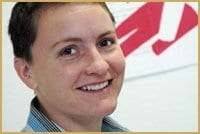Tammy Hinsche was sitting under a big baobab tree in Eritrea, a small African country just south of Ethiopia. She had just begun her three-week field placement for Medecins Sans Frontieres (MSF), better known as Doctors Without Borders, and it was unbearably hot, dry and dusty.
“Everybody has those moments where they feel like they get knocked over the head,” she says. “And I’m sitting there looking around, and there’s this Land Cruiser and this big water tank and I’m thinking, ‘This is the greatest thing.'”
Hinsche’s work has taken her to many different places overseas, including the Republic of Congo and Turkmenistan. She also went to Indonesia after last year’s tsunami.
Hinsche attributes her passion for her profession to her solid upbringing with kind, compassionate parents, and she carries this compassion with her on her missions. Still, she admits that living and working in a place where people are in such dire need of basic necessities like food, water and vaccinations can be difficult.
“It’s frustrating being in Turkmenistan, where it’s a really oppressive country to live in and there’s some huge medical needs. People are dying from TB,” she says. “It’s frustrating seeing people who are in need for something pretty simple and basic and available and not having the money to access it, or people not [having] support from their own government.”
Hinsche recalls the difficulty of working in a therapeutic feeding centre in Africa for malnourished children.
“I remember seeing this little baby. This one was so tiny she was literally skin and bones,” Hinsche says. “I just remember seeing her little bum. And there was no squishy little baby bum, you know. And I just found it heartbreaking. This image of this starving child was burned into my mind and it just felt so, so wrong.”
Sometimes, returning to the privilege of a first world country can be just as hard.
“It’s frustrating coming back here and seeing the incredible wealth and privilege we have and how excessive and wasteful our society is in some ways,” says Hinsche. “It’s hard to be in the middle of both. I don’t want to become a bush girl in Africa, I don’t. But at the same time, I don’t need to drive a Hummer in the city.”
Hinsche didn’t grow up wanting to change the world. The Squamish, BC native seriously considered a career in theatre, but decided against it to pursue a degree in geography and environmental studies at the University of Victoria. After graduation, she left BC for Montreal to learn French, then moved to Toronto to work in human resources in the city’s financial district.
While in Toronto, Hinsche volunteered for Youth Challenge International, which gave her a taste of living overseas in a culture that suffered from limited resources. When a job as a logistician administrator — log for short — came up at MSF’s Toronto office, Hinsche went after it.
“A log does a lot of stuff. Logs are basically there to support the medical program so they can do what they need to do,” Hinsche says. “It’s very behind the scenes, but really gives the doctors and nurses and midwives the space to do their work, do the treatment and see the patients.”
And Hinsche really enjoys having a job that is an integral part of MSF missions.
“It’s sort of like the backbone of the system,” she says. “A doctor can go out with his little medical bag and only do so much. With the logistics, it’s kind of a thankless job but I think it’s one of the best jobs.”
Another challenge to the job is living in a culture where being gay isn’t as accepted or tolerated as it is in North America. When she’s overseas, Hinsche generally doesn’t talk about her sexual orientation with local people for fear of her safety.
“I don’t wear a little tag on my shirt that says, ‘I’m queer.’ In Turkmenistan, you disappear for that kind of stuff,” Hinsche explains. “It’s not something you talk about. Culturally, it’s just very different. You can’t compare being queer in Toronto or Vancouver to being queer in the Congo or in Turkmenistan.”
Suppressing a part of her identity is a struggle, particularly when it’s for long periods of time.
“It’s hard. You know, the first time I went over, I was going crazy by the time I got back,” she says. “I miss queer culture. I get sick and tired of everybody assuming I’m straight and playing the pronoun game. I’m not completely defined by being queer. But it’s also part of who I am and it’s difficult when you can’t be who you want to be.”
But Hinsche also recognizes that when she’s overseas, some things are simply more important than promoting gay culture.
“I don’t have an agenda when I go overseas with MSF,” Hinsche explains. “It’s about the humanitarian medical aid, it’s not about queer rights. I’m not in the position to be able to talk about that or change anything. We’re not doing gay pride in the Congo.”
Despite the difficulty of the job, Hinsche hopes to go out in the field again soon.
“The best part is knowing that you’ve made a difference somehow. Somebody’s father’s not going to die of malaria, somebody’s child might get a chance to see the next year,” Hinsche says. “Even though I’m sitting behind a desk right now pushing paper, what I’m doing here makes a difference out there. And I think everybody wants to know they’ve made a difference in the world.”

 Why you can trust Xtra
Why you can trust Xtra


